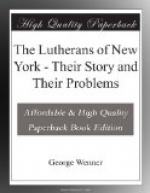Low Germans, (Nether Saxons or Platt Deutsch) who have settled in New York in such large numbers, enjoy a distinct advantage over other nationalities. In the vernacular of America they discover simply another dialect of their native tongue. Hence they acquire the new dialect with little difficulty. The simpler words and expressions of the common people are almost the same as those which they used on the shores of the North Sea and the Baltic. For example: Wo is min Vader? Where is my father? He is in the Hus. He is in the house. English and German sailors from opposite shores of the North Sea, using the simpler words of their respective languages, have no trouble in making themselves understood when they meet.
The High Germans learn English more slowly, but they, too, find many points of contact, not only in the words but also in the grammatical construction of the language.
In the United States the descendants of Germans number seventeen millions. They have made no inconsiderable contributions to the sum total of American civilization. For philological reasons, as we have seen, no people are more ready than the Germans to adopt English for every-day use. None amalgamate more easily with the political and social life of the country of their choice. In normal times we do not think of them as foreigners.
English has the right of way. Its composite character makes it the language for every-day use. Thirty-five languages are spoken in this city, but the assimilative power of English absorbs them all. The Public School is the effective agent in the process. This is the melting pot for all diversities of speech. Children dislike to be looked upon as different from their companions, and so it rarely happens that the language of the parents is spoken by the second generation of immigrant families. Their elders, even when their “speech bewrayeth” them, make strenuous efforts to use the language of their neighbors.
Seeing, then, that Anglicization is inevitable, why should we not cut the Gordian knot, and conduct our ministry wholly in the English language? This would greatly simplify our tasks, besides removing from us the stigma of foreignism.
We are often advised to do so, especially by our monoglot brethren. There are those who go so far as to say that the use of any language other than the English impairs the Americanism of the user.
Some of the languages at present used in our church services may be of negligible importance. The Slovak, Magyar and Finnish for example, as well as the Lettish, Esthonian and Lithuanian of the Baltic Provinces, will never have more than a restricted use in this city. The Scandinavians and those whose vernacular is the Low German easily substitute English for their mother tongue. Scandinavian is kindred to English, while Low German is the very group of which, philologically speaking, English is the most conspicuous member. Upon these tongues it will not be necessary to do summary execution.




